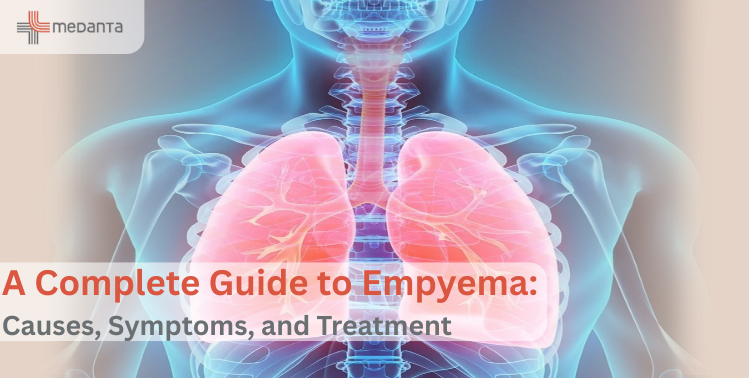CH Baktawar Singh Rd, Medicity, Islampur Colony, Sector 38, Gurugram, Haryana 122001

28 August, 2025
adminEmpyema is a critical medical condition characterized by the accumulation of pus in the pleural space, which is the narrow area between the lung and the chest wall. Condition arises as complication of lung infections Pneumonia or tuberculosis. If not addressed promptly, empyema can lead to significant respiratory difficulties and may even pose a threat to life.
Understanding the underlying causes, warning signs, and available treatment options for empyema is essential for early detection and improved recovery outcomes. In this article, we offer a thorough, medically precise, and easily comprehensible guide to enhance your understanding of empyema.
Empyema Prothorax Purulent Pleuritis Infection Pleural Space Pus Bacterial Infection Chest Pain Fever Cough Fatigue Weight Loss Breathing Difficulty Pneumonia Tuberculosis Complication Treatment Drainage Antibiotics Surgery Recovery. The pus consists of white blood cells, bacteria, and necrotic tissue.
Pleural effusion involves fluid without infection involves bacterial infection and pus buildup
Empyema arises from pneumonia complication Causes include:
Empyema symptoms vary by infection stage Common indicators include:
If these symptoms occur after a recent chest infection, medical attention is urgently needed.
Doctors use a combination of physical examinations and diagnostic tests to confirm the condition:
The main goal of treatment is to eliminate infection and remove pus from the pleural space. The treatment approach depends on the severity and stage.
Antibiotics
Strong intravenous (IV) antibiotics are given to target the infection. The type of antibiotic depends on the bacteria found in the fluid analysis.
Drainage Procedures
Fibrinolytic Therapy
Medication is delivered into the pleural space to break down thick pus and make drainage easier.
Surgery
If empyema is in the organizing stage or doesn’t improve with drainage:
Delaying treatment for empyema can lead to:
Chronic empyema – Persistent infection requiring major surgery.
Effective Ways to Reduce Risk of Developing Serious Health Conditions:
Recovery depends on the severity of the condition and how quickly treatment begins. Patients may need:
Seek urgent medical attention if you experience:
Early diagnosis is key to preventing life-threatening complications.
Empyema: Serious Condition Treatable with Early Diagnosis By understanding the symptoms, causes, and treatment options, patients can take timely action and recover fully.
If you or a loved one shows signs of after a lung infection, consult a healthcare provider immediately. Prompt medical care can save lives and prevent long-term damage.
Category : Empyema
Tags: Empyema